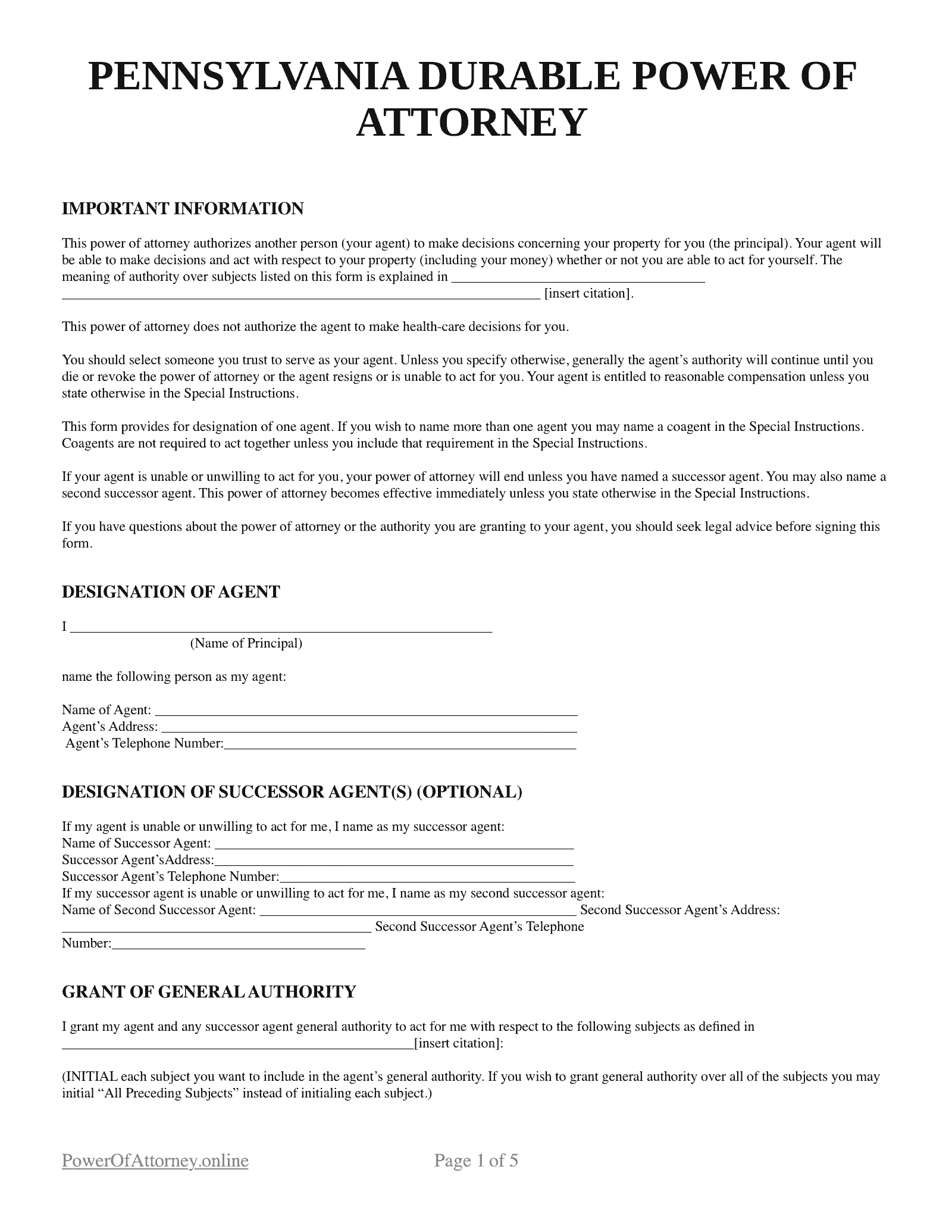Free Pennsylvania Power of Attorney Forms
A Power of Attorney (POA) is a form that authorizes an individual, also known as an agent or attorney-in-fact, to carry out certain legal tasks on another individual’s behalf.
The person who creates a power of attorney and assigns legal authorization is known as the principal, donor, or grantor.
A power of attorney is usually created when the principal has either a short-term or long-term illness that may leave them unable to communicate or make sound decisions. They are also often created by the elderly and active service members.
The agent should be someone the principal can trust to make decisions that would be in their best interest.

Pennsylvania Power of Attorney by Type
A power of attorney document is not just limited to one general type of authorization. Various POA documents provide specific amounts of legal authority to an agent.
Depending on your circumstances, one power of attorney may be more beneficial to you than another. It’s essential to understand the POA you need and understand what is and is not permitted or required in Pennsylvania.
Below you can find a summary of each type of POA.
General Power of Attorney
A Pennsylvania general power of attorney allows an agent to make financial decisions in the principal’s name.
There is a limitation to this authorization. The agent will not be permitted to grant themselves a financial gift from the principal with a general POA.
Durable Power of Attorney
When the principal becomes incapacitated, a POA will be terminated in most cases.
However, a Pennsylvania durable power of attorney ensures that the agent will remain authorized to make financial decisions even if the principal becomes incompetent.
This authorization will last until the principal passes away (§ 5604(a)).
Medical Power of Attorney
It’s also possible to permit an individual to make health care decisions on your behalf with a Pennsylvania medical power of attorney (MPOA). The agent should be someone you trust and clearly understand your healthcare preferences regarding end-of-life treatments.
If a living will is paired with a power of attorney in Pennsylvania, it will create an advance health care directive (§ 5422).
How to Get a Power of Attorney in Pennsylvania
States have different requirements to complete a power of attorney document and ensure it is legally valid.
For a Pennsylvania power of attorney to come into effect, it must meet certain state requirements.
There are also specific signing requirements for each type of power of attorney in Pennsylvania, which you must follow.
In the case of a Pennsylvania general or durable power of attorney, you must sign either document in front of a notary and two witnesses (neither being the agent). A Pennsylvania MPOA only requires two witnesses during the signing.
It’s essential to create a copy of the POA for yourself and the agent.
Pennsylvania Power of Attorney Laws
Power of attorney laws in Pennsylvania are set by the Pennsylvania General Assembly. Chapter 56 of Title 20 of the Pennsylvania consolidated statutes (§ 5601) covers the definitions, requirements, and limitations of the power of attorney forms in the state.
The statute specifies that a POA must meet the following requirements:
- Power of attorney documents must be dated the day of their signing.
- It must be signed by the principal. If the principal is unable to sign, another individual of legal age may sign the document, but only with specific instructions from the principal.
- It must meet all signing requirements to be considered legally valid. General and durable power of attorneys need to be signed in the presence of a notary public, while an MPOA does not.
Once a Pennsylvania POA is put into effect, an agent may be allowed to buy and sell the assets and property of the principal, open accounts, as well as create trusts. This power will not remain in effect if you become incapacitated unless it is a durable POA.
FAQs About Pennsylvania Power of Attorney Forms
There are often some doubts concerning how to properly create and use a power of attorney in Pennsylvania.
To clear up any confusion, you can go over the answers to some of the most frequently asked questions below.